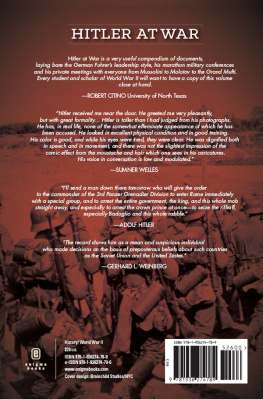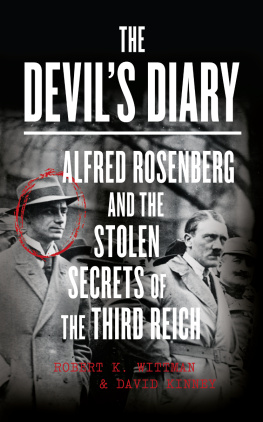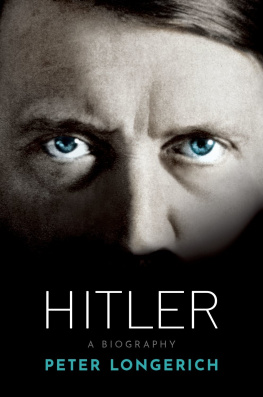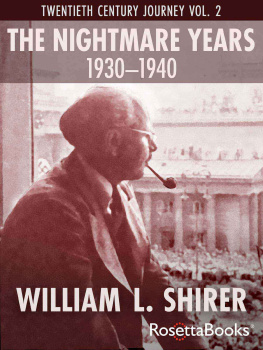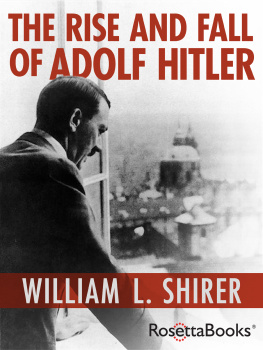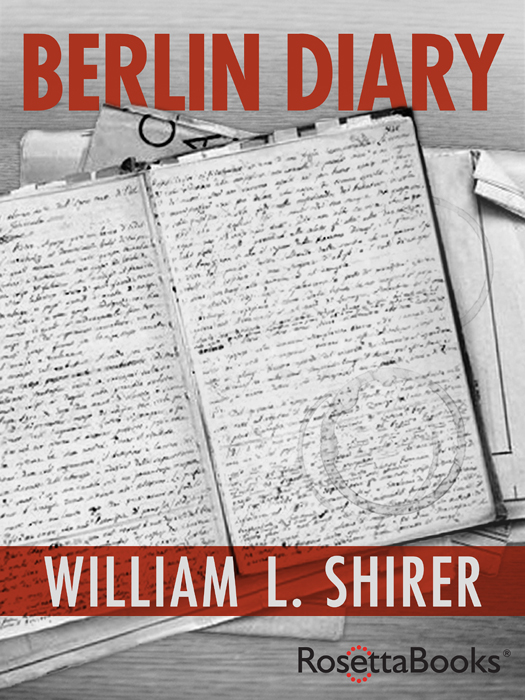William L. Shirer
Copyright
Berlin Diary
Copyright 1941, renewed 1968 by William L. Shirer
Cover art to the electronic edition copyright 2011 by RosettaBooks, LLC
All rights reserved. No part of this book may be used or reproduced in any form or by any electronic or mechanical means, including information storage and retrieval systems, without permission in writing from the publisher, except by a reviewer who may quote brief passages in a review.
Electronic edition published 2011 by RosettaBooks LLC, New York.
Cover jacket design by Alexia Garaventa
ISBN e-Pub edition: 9780795316982
To Tess
Who Shared So Much
Contents
Endnotes
A right-wing organization of some eight hundred thousand members. Frances other four million war veterans were organized in the Fdration des Anciens Combattants.
The text: Law for the Re-Creation of the National Defence Forces.
The Reich government has decreed the following law, which is herewith proclaimed:
1. Service in the defence forces is based on universal military service.
2. The German peace army, inclusive of police units incorporated therein, comprises twelve corps commands and thirty-six divisions.
3. Supplementary laws for regulating universal military service will be drafted and presented to the Reich Cabinet by the Reich Minister of Defence.
Sir Nevile Henderson in Failure of a Mission has told us since that during the first talk after Chamberlain had outlined his plan of complete surrender to Hitler, the Fhrer looked at him and said: Es tut mir furchtbar leid, aber das geht nicht mehr (Im awfully sorry, but that wont do any more). Chamberlain, says Henderson, expressed his surprise and indignation.
In the next days it furnished the only means of communication between Prague and the outside world.
Panton was arrested in Copenhagen in April 1940, when the Germans marched in, and interned on a Danish island. The French Minister in Copenhagen insisted on taking out all French and Polish correspondents caught there by the Germans. The British Minister made no effort to and the four English journalists there were all arrested and interned.
Only on the night of August 31, nine hours before the war started, did we learn that the reply contained a demand that Poland send a representative invested with plenipotentiary powers on Wednesday, August 30that is, within twenty-four hours. Henderson remarked to Hitler: That sounds like an ultimatum, but the Great Man denied it. Throughout this period the correspondents were kept largely in the dark about the negotiations, with the Wilhelmstrasse tipping us (falsely) to take an optimistic line.
Even this was not true. Henderson revealed later that Ribbentropin a most insolent moodread the sixteen points to him so rapidly that he could not grasp them. When he asked for a copy of them, the German Foreign Minister refused!
Actually Bonnet boasted after the Franco-German armistice that he had refused the plea of Halifax for a simultaneous declaration of war. He played for peace at any price until the very end.
Reichs Rundfunk Gesellschaftthe German State Broadcasting Company.
Many months later I learned from an unimpeachable source that Fritsch did seek death and that three letters he wrote shortly before the action proved it. It is said in German army circles that his wound, though serious, would in all probability not have caused his death had he not refused the pleas of his adjutant to let himself be carried to the rear. He would not listen to it. He bled to death.
About 3.3 by 1.5 yards.
Later the British Admiralty confirmed his version of both the Royal Sceptre episode and the saucy message to Mr. Churchill, including the fact that Schultze had not been captured.
For months we were to ask at nearly every Nazi press conference when the trial of Elser would take place. At first we were told he would be tried before the Supreme Court at Leipzig as were the perpetrators of the Reichstag fire, which seemed appropriate enough, since both events cast suspicion on the Nazis themselves. After a few weeks our daily question: When will Elser be tried? provoked scarcely restrained laughter from the correspondents and increasing embarrassment for Dr. Boehmer, foreign press chief of the Propaganda Ministry, Dr. Schmidt, press chief of the Foreign Office, and the latters deputy, Baron von Stumm. Finally we were given to understand that the question wasnt funny any more, and after some months, having squeezed all we could out of our joke, we dropped it. So far as is known, Elser was never tried. Whether he was executed also is not known.
His moving Christmas broadcast from the Finnish front was to Inspire Robert Sherwoods play There Shall Be No Night.
To which Stalin replied: The friendship of the peoples of Germany and the Soviet Union, cemented by blood, has every reason to be lasting and firm!
The official German decree read: All Jew s from fourteen to sixty years of age are subject to forced labour. The length of forced labour is two years, but it will be prolonged if its educational purpose is not considered fulfilled. Jews called up for forced labour must report promptly, and must bring food for two days and their bedding. Skilled Jewish workers must report with their tools. Those who dont are subject to sentences running to ten years in the penitentiary.
.
Within or without wedlock. On October 28, 1939 Heinrich Himmler, chief of the German police and leader of the S.S., decreed: Beyond the borders of perhaps necessary bourgeois laws, customs, and views, it will now be the great task, even outside the marriage bond, for German women and girls of good blood, not in frivolity but in deep moral earnestness, to become mothers of the children of soldiers going off to war. On the men and women whose place remains at home by order of the state, these times likewise impose more than ever the sacred obligation to become again fathers and mothers of children. (Italics mine.) Himmler promised that the S.S. would take over the guardianship of all legitimate and illegitimate children of Aryan blood whose fathers met death at the front.
This was a lie, as later entries will show.
The destroyer, we would learn later, was the Glow-worm, the only craft in the whole British navy to encounter any of the scores of German war vessels and transports which stole up the Norwegian coast before April 9. It sighted the German 10,000-ton cruiser Admiral Hipper off the Norwegian coast on April 8, but was blown to bits before it could get away. Had just a small British naval force, such as later went into Narvik, been within striking distance of the Norwegian coast on April 8, Hitlers Norwegian venture would have failed. One can only conclude that the British navy was caught napping.
German for anti-aircraft gun.
There was no sniping in 1940.
A fair example of Grings exaggerations. When I visited the beach of Dunkirk two and a half months later, I found the wrecks of only two freighters, two destroyers, and one torpedo boat.
Later named by Marshal Ptain French Ambassador in Washington.
Within less than four months he was killed in a British bomber returning from a raid on the Italian lines in Albania.
It is only fair to state that the officials of the German State Broadcasting Company, who treated me with the greatest courtesy throughout the war, never objected to my listening to what the enemy had to say on the BBC. They usually put a radio set at my disposal for this purpose. Foreign correspondents were exempted from the decree prohibiting listening to foreign radio stations as long as they did not pass on what they heard to Germans. Radio provided the only means we in Berlin had of learning what was going on in the outside world. Sale of foreign newspapers except those from Italy or the occupied cities was forbidden. Occasionally a few American newspapers and periodicals got through in the mails, but they were from two to six months old by the time they arrived.




